The elegant Terracotta pot will showcase your plants and grant them the attention they truly deserve. Designed by Vitra in collaboration with Thélonious Goupil, the pot charms with its two-part, columnar shape, which not only serves as a visual detail but also functions as a sturdy base, elevating your beloved plants, flowers and blossoms to new heights. Hence the name, the pot is made from terracotta and glazed on the inside, while the outside has an unglazed and textured surface, adding a touch of refined ruggedness to the pot's overall aesthetic. The versatile Terracotta pot suits both indoor and outdoor use.
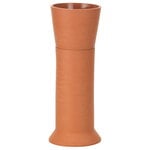
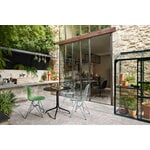

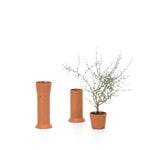
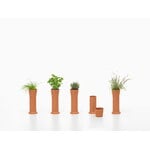
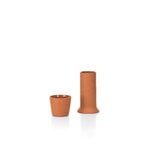
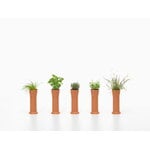
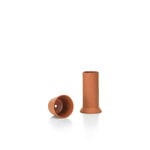
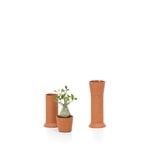
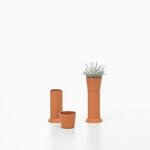
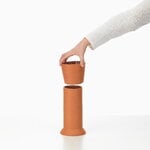
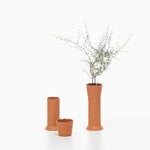
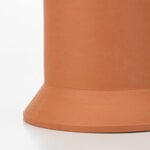
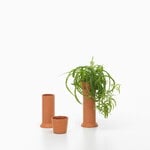
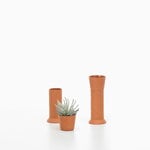
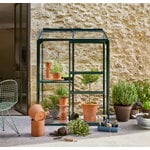
Terracotta pot, XS, terracotta
Vitra
Description
The elegant Terracotta pot will showcase your plants and grant them the attention they truly deserve. Designed by Vitra in collaboration with Thélonious Goupil, the pot charms with its two-part, columnar shape, which not only serves as a visual detail but also functions as a sturdy base, elevating your beloved plants, flowers and blossoms to new heights. Hence the name, the pot is made from terracotta and glazed on the inside, while the outside has an unglazed and textured surface, adding a touch of refined ruggedness to the pot's overall aesthetic. The versatile Terracotta pot suits both indoor and outdoor use.
Product details (7)
- Material
- 100% terracotta, glazed finish on the inside
- Colour
- Terracotta
- Width
- 12 cm
- Height
- 35 cm
- Diameter
- 12 cm
- Measurement details
- Base diameter 13,5 cm
- Notes
- There is drainage hole in the bottom of the pot.
- Product ID
Designer
Thélonius Goupil (b. 1991) is a French designer with a keen eye for detail and a deep understanding of materials and production techniques. Goupil graduated from Ensci-Les Ateliers in Paris in 2016. After that, he honed his skills and gained experience by training at renowned design firms like Ransmeier Inc. and Jasper Morrison Ltd. In 2018, Goupil founded his eponymous studio, where he focuses on developing innovative and thoughtful designs for various objects and furniture. His creative process revolves around seeking shapes that harmoniously balance the limitations of each project.
View all productsReviews (0)
Sustainability
The Product Sustainability Framework, our criteria of sustainable design, helps you find the most sustainable products in our selection. Read below which sustainability criteria this product has met.
Working conditions & labour 7/9
-
Equal opportunities for all employees
-
Commitment to UN Global Compact, fair compensation for all employees
-
Corporate responsibility requirements defined and communicated for suppliers
-
Systematic work for improved inclusion and well-being in the workplace
-
Transparent supply chain
-
Suppliers' compliance to a code of conduct ensured
-
Compliance to the UN Guiding Principles on Business and Human Rights ensured in the supply chain
-
Direct suppliers audited and certified
-
Support for community involvement in the supply chain
Eco-friendly production 7/9
-
Fair and resource-wise water-use in production
-
No incineration or landfilling of returned items
-
No use of endangered species as materials
-
No direct environmental emissions or waste (excl. GHGs) from production
-
Production and material sourcing that respect biodiversity, animal rights, and natural ecosystems
-
Material-efficient and ecological packaging
-
No potentially harmful chemicals used in own production
-
The sustainability of direct suppliers' production is addressed and monitored
-
Positive impact on nature’s well-being through operations that regenerate natural ecosystems
Climate impact 5/8
-
Company's direct greenhouse gas emissions identified and commitment to reduction
-
Product's carbon impact identified and commitment to reduction
-
Guidance on energy- and eco-efficient use of the product
-
Contribution to climate initiatives beyond the brand’s direct operations
-
100 % renewable energy in own production and operations
-
Low-carbon or compensated transportation
-
Carbon footprint of the product calculated and goals set to reduce it
-
Carbon neutral or carbon negative product
Sustainable materials 6/6
-
Sustainable and long-lasting material choices
-
No harmful or hazardous substances
-
Responsible raw material sourcing and production
-
Materials suited for circularity: monomaterials, recyclable finishings, renewable or recycled contents etc.
-
Ecological materials: natural, biodegradable, recyclable or recycled contents
-
Outstanding materials in terms of innovativeness, responsibility, sustainability and circularity: local production or sourcing, 100 % recycled content, C2C-certification etc.
Circular design 4/5
-
High aesthetic quality promoting long-term use of the product
-
Technically durable product design and material choices
-
Design for enduring life-long quality
-
Design and support for product maintenance, repair and upgradability
-
Innovative circular design solutions: circular service system, resale platform, remanufacturing, collection of used products, etc.


















